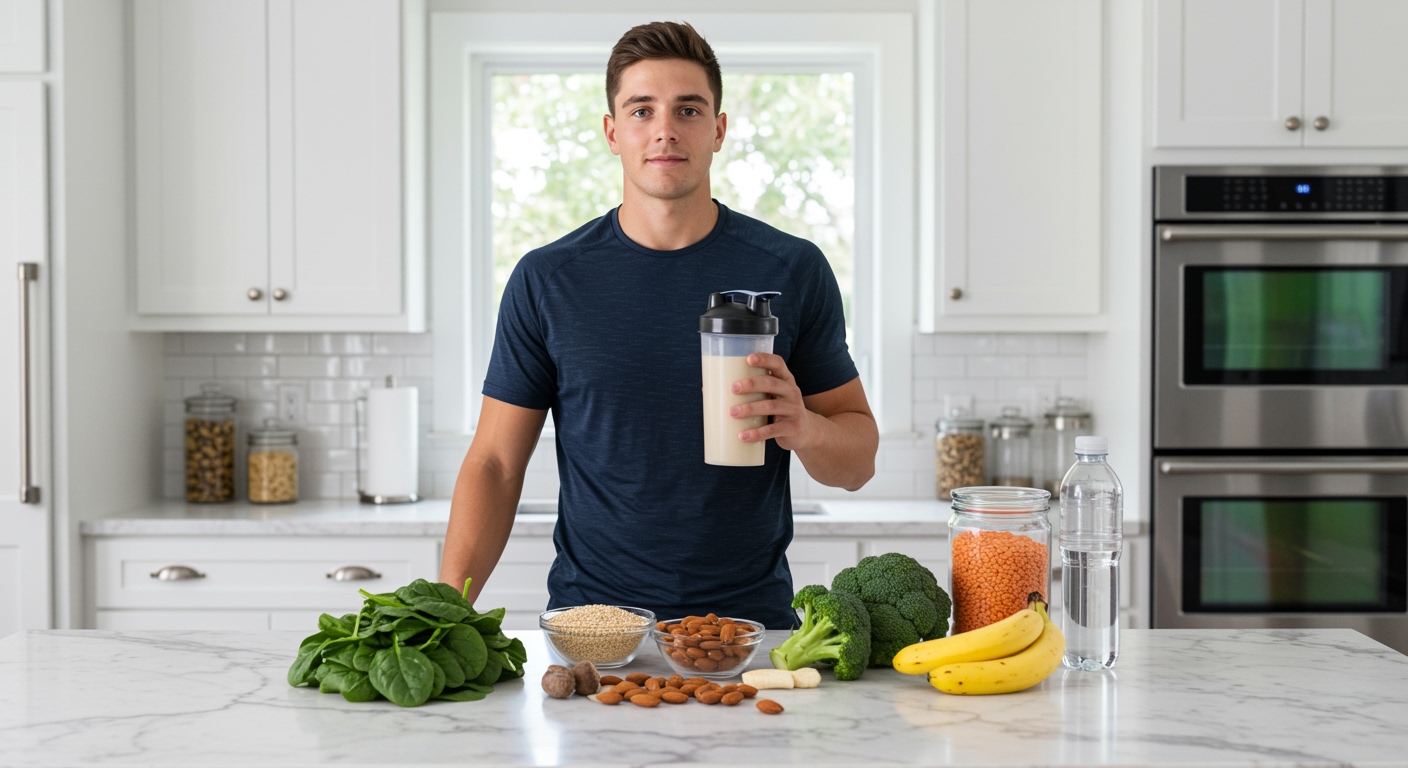✪ Key Highlight: Recent study shows vegan diets support athletic performance while reducing inflammation and cardiovascular risk factors.
Introduction
Athletes around the world are questioning everything they know about sports nutrition.
New research published in the journal Nutrients reveals that vegan diets can support high-level athletic training without compromising performance in the short term.
Hi, I’m Abdur, your nutrition coach and today I’m going to analyze this groundbreaking study that challenges traditional beliefs about plant-based nutrition for serious athletes.
Can Vegan Diets Really Support Athletic Performance?
The recent study involving semi-professional soccer players provides compelling evidence that vegan diets do not hinder athletic performance.
Both vegan and control groups showed improved performance after the intervention period.
The vegan group experienced a small but noticeable boost in maximum treadmill running speed of about 0.87 kilometers per hour.
Time to exhaustion increased in both groups, indicating that training itself was the primary driver of performance improvements.
The study authors concluded that a short-term vegan diet may be suitable for semi-professional soccer players without causing any performance setbacks.
However, researchers emphasized that their findings represent early evidence rather than definitive proof due to the small, non-randomized study design.
✪ Fact: Plant-based diets can reduce cardiovascular risk factors that are crucial for athletes who stress their bodies during intense training.
What About Oxygen Usage And Aerobic Capacity?
One fascinating finding was the increase in relative VO2 max in the vegan group compared to the control group.
VO2 max measures how efficiently your body uses oxygen during exercise, which directly impacts endurance performance.
However, this improvement was primarily due to weight loss rather than an actual increase in aerobic capacity.
The absolute VO2 max, which measures total oxygen consumption, remained relatively unchanged in both groups throughout the study period.
This distinction is important because it shows that vegan diets may help athletes achieve better power-to-weight ratios without necessarily improving raw aerobic capacity.
A systematic review in the British Journal of Nutrition supports these findings, showing that plant-based diets offer moderate boosts to aerobic performance.
✪ Pro Tip: Focus on your power-to-weight ratio rather than absolute strength when evaluating vegan diet benefits for endurance sports.
Do Vegan Athletes Risk Losing Muscle Mass?
The concern about muscle loss on vegan diets is one of the biggest fears among athletes considering this nutritional approach.
Research shows that vegans may have slightly lower muscle mass compared to omnivores, but this does not always translate to weaker performance.
A study published in Nutrients demonstrated that muscle strength can be built and maintained on a vegan diet when protein needs are met.
The key lies in combining structured exercise with smart food choices that provide all essential amino acids.
Dr. Evelyn Medawar, the lead author of the study, emphasized that athletes must ensure they get enough high-quality protein to avoid muscle loss.
Plant proteins have lower bioavailability compared to animal proteins, which means vegan athletes need to be more strategic about their protein intake.
Combining different plant proteins throughout the day helps create complete amino acid profiles necessary for muscle maintenance and growth.
✪ Note: Vegan athletes should consume 1.6-2.2 grams of protein per kilogram of body weight to maintain muscle mass effectively.
Which Nutrients Need Special Attention On Vegan Diets?
While vegan diets offer many health benefits, athletes must pay careful attention to specific nutrient deficiencies that could impact performance.
Vitamin B12 is perhaps the most critical concern since it is found almost exclusively in animal products.
Iron absorption from plant sources is lower than from meat, which could lead to iron deficiency and reduced oxygen-carrying capacity.
Omega-3 fatty acids, particularly EPA and DHA, are found in lower amounts in plant foods compared to fish and seafood.
Creatine, which helps with explosive power and muscle recovery, is naturally found in meat and may need to be supplemented in vegan athletes.
Dr. Medawar recommends that athletes work with nutrition professionals to ensure they meet all their nutritional needs on a vegan diet.
Regular blood testing can help identify potential deficiencies before they impact training and performance.
✪ Pro Tip: Combine vitamin C-rich foods with iron-rich plants to enhance iron absorption and prevent deficiency in vegan athletes.
What Are The Long-Term Implications For Athletic Performance?
The current research provides encouraging short-term results, but questions remain about long-term effects of vegan diets on athletic performance.
Most studies have focused on periods of weeks to months rather than years of vegan nutrition in competitive athletes.
The anti-inflammatory and cardiovascular benefits of plant-based diets could provide significant advantages for recovery and longevity in sports careers.
Reduced oxidative stress from plant-rich diets may help athletes maintain peak performance as they age.
However, the potential for nutrient deficiencies over time requires careful monitoring and possibly strategic supplementation.
Larger, randomized controlled trials are needed to fully understand how vegan diets affect different types of athletes across various sports.
✪ Fact: The anti-inflammatory effects of plant-based diets may accelerate recovery between training sessions and reduce injury risk.
The Bottom Line
Vegan diets can absolutely support high-level athletic training without compromising performance in the short term.
Smart planning beats perfect nutrition every single time – the key is ensuring adequate protein intake and monitoring for potential nutrient deficiencies.
I would love to hear your thoughts about vegan nutrition for athletes – have you tried plant-based eating for your training, or do you have questions about making this transition safely?
References
At NutritionCrown, we use quality and credible sources to ensure our content is accurate and trustworthy. Below are the sources referenced in creating this article:
- PMC: Vegan Diet and Athletic Performance
- PMC: Plant-Based Diets in Sports
- News Medical: Vegan Diets Support High-Level Training
- British Journal of Nutrition: Plant-Based Diets and Athletic Performance
- Examine: Vegan Diet Research Analysis





